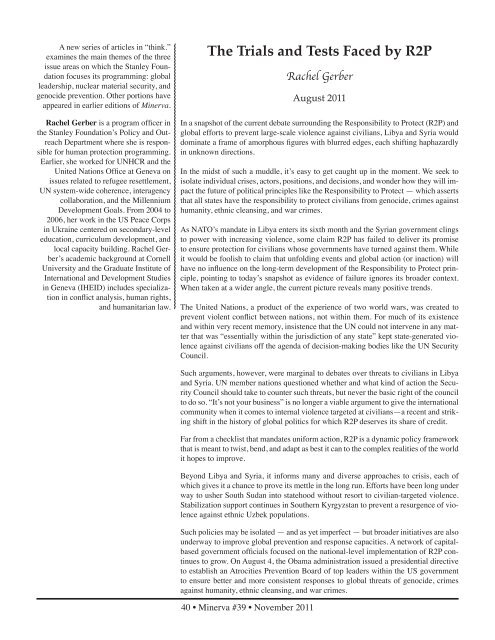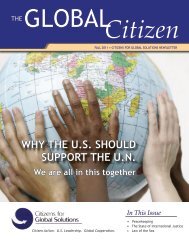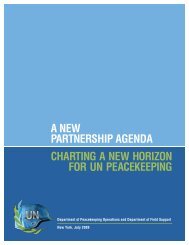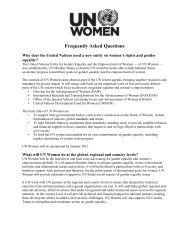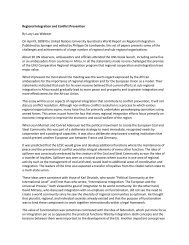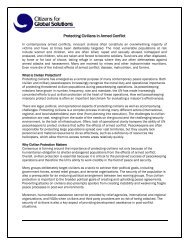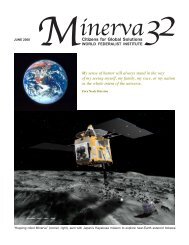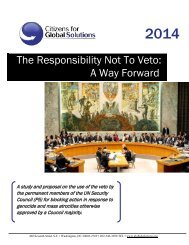A new series of articles in “think.”examines the main themes of the threeissue areas on which the Stanley Foundationfocuses its programming: globalleadership, nuclear material security, andgenocide prevention. Other portions haveappeared in earlier editions of <strong>Minerva</strong>.Rachel Gerber is a program officer inthe Stanley Foundation’s Policy and OutreachDepartment where she is responsible<strong>for</strong> human protection programming.Earlier, she worked <strong>for</strong> UNHCR and theUnited Nations Office at Geneva onissues related to refugee resettlement,UN system-wide coherence, interagencycollaboration, and the MillenniumDevelopment Goals. From 2004 to2006, her work in the US Peace Corpsin Ukraine centered on secondary-leveleducation, curriculum development, andlocal capacity building. Rachel Gerber’sacademic background at CornellUniversity and the Graduate Institute ofInternational and Development Studiesin Geneva (IHEID) includes specializationin conflict analysis, human rights,and humanitarian law.The Trials and Tests Faced by R2PRachel GerberAugust <strong>2011</strong>In a snapshot of the current debate surrounding the Responsibility to Protect (R2P) andglobal ef<strong>for</strong>ts to prevent large-scale violence against civilians, Libya and Syria woulddominate a frame of amorphous figures with blurred edges, each shifting haphazardlyin unknown directions.In the midst of such a muddle, it’s easy to get caught up in the moment. We seek toisolate individual crises, actors, positions, and decisions, and wonder how they will impactthe future of political principles like the Responsibility to Protect — which assertsthat all states have the responsibility to protect civilians from genocide, crimes againsthumanity, ethnic cleansing, and war crimes.As NATO’s mandate in Libya enters its sixth month and the Syrian government clingsto power with increasing violence, some claim R2P has failed to deliver its promiseto ensure protection <strong>for</strong> civilians whose governments have turned against them. Whileit would be foolish to claim that unfolding events and global action (or inaction) willhave no influence on the long-term development of the Responsibility to Protect principle,pointing to today’s snapshot as evidence of failure ignores its broader context.When taken at a wider angle, the current picture reveals many positive trends.The United Nations, a product of the experience of two world wars, was created toprevent violent conflict between nations, not within them. For much of its existenceand within very recent memory, insistence that the UN could not intervene in any matterthat was “essentially within the jurisdiction of any state” kept state-generated violenceagainst civilians off the agenda of decision-making bodies like the UN SecurityCouncil.Such arguments, however, were marginal to debates over threats to civilians in Libyaand Syria. UN member nations questioned whether and what kind of action the SecurityCouncil should take to counter such threats, but never the basic right of the councilto do so. “It’s not your business” is no longer a viable argument to give the internationalcommunity when it comes to internal violence targeted at civilians—a recent and strikingshift in the history of global politics <strong>for</strong> which R2P deserves its share of credit.Far from a checklist that mandates uni<strong>for</strong>m action, R2P is a dynamic policy frameworkthat is meant to twist, bend, and adapt as best it can to the complex realities of the worldit hopes to improve.Beyond Libya and Syria, it in<strong>for</strong>ms many and diverse approaches to crisis, each ofwhich gives it a chance to prove its mettle in the long run. Ef<strong>for</strong>ts have been long underway to usher South Sudan into statehood without resort to civilian-targeted violence.Stabilization support continues in Southern Kyrgyzstan to prevent a resurgence of violenceagainst ethnic Uzbek populations.Such policies may be isolated — and as yet imperfect — but broader initiatives are alsounderway to improve global prevention and response capacities. A network of capitalbasedgovernment officials focused on the national-level implementation of R2P continuesto grow. On August 4, the Obama administration issued a presidential directiveto establish an Atrocities Prevention Board of top leaders within the US governmentto ensure better and more consistent responses to global threats of genocide, crimesagainst humanity, ethnic cleansing, and war crimes.40 • <strong>Minerva</strong> #39 • November <strong>2011</strong>
All of these ef<strong>for</strong>ts reflect a sense of obligationto protect civilians from massatrocity violence — a sense that continuesto root itself deeper within the psycheof global leaders. The fact that this sensehas begun to compel action, however imperfect,reflects an early success <strong>for</strong> theResponsibility to Protect.Moving <strong>for</strong>ward, novel approaches andcompelling moral sentiments must eventuallymeet the messy realities of theworld.Many have classified the campaign inLibya as a mistake because the conflicthas proven more protracted and complexthan initially anticipated. Struggle isequated with error. Though, as decades ofpeacekeeping experience have taught us,civilian protection is rarely a simple endeavor.We learn by doing and, until very recently,inaction has been the global responseto mass violence. As R2P is applied, mistakeswill be made, as must adjustments.Translating a sense of obligation into effectivepolicies requires experimentationand adaptive learning.<strong>Global</strong> leaders must take care that this inevitableprocess of trial and error does notautomatically become trial by fire <strong>for</strong> thebroader commitments made in adoptingthe Responsibility to Protect.A recent debate on the Responsibility toProtect within the UN General Assemblysuggests that governments understandthis problem, and remain committed topreserving R2P, even when its applicationin cases like Libya raises more questionsthan it provides answers.As global events unfold, R2P is facing thetests and trials that both its supporters andskeptics always knew it would. But thereal world is where we all must come ofage. In the end, we are stronger <strong>for</strong> it.ïBeginning in 1945 with his prosecutionof war criminals during the NurembergTribunal, the work of Benjamin Ferenczhas long focused on issues of internationalcriminal justice and world peace.A strong supporter of the InternationalCriminal Court, Mr Ferencz vigorouslyadvocates steps to replace the “rule of<strong>for</strong>ce with the rule of law”.Mr Lubanga was taken into custody bythe ICC on 17 March 2006 to face chargesrelating to the enlistment & conscriptionof child soldiers and <strong>for</strong>cing their participationin the armed conflict in Ituri, DemocraticRepublic of the Congo.In a Los Angeles Times op-ed column (4June 2010), <strong>Citizens</strong> <strong>for</strong> <strong>Global</strong> <strong>Solutions</strong>Executive Vice President Robert A. Enholmwrote: “The United States led inhelping the world understand the meaningof ‘aggressive war’ in the Nuremberg andTokyo war crimes trials. The US shouldcooperate with the ICC and resolve overtime the impediments to the US <strong>for</strong>mallyjoining the ICC ….” Meanwhile, “Evidenceshows that prosecution by the ICC<strong>for</strong> conscripting child soldiers has causedcombatant leaders in other countries torelease child soldiers and spurn their use.The establishment of global standards canhave a positive deterrent effect. A countrywithout the military power of the UnitedStates might reasonably conclude that therule of law is valuable protection againstthe use of aggressive <strong>for</strong>ce.Speech at Closing of Lubanga CaseBenjamin B. FerenczInternational Criminal Court, The Hague, August <strong>2011</strong>This is a historic moment in the evolution of international criminal law. For the firsttime a permanent international criminal court will hear the closing statement <strong>for</strong> theProsecution as it concludes it first case against its first accused, Mr. Thomas LubangaDyilo [president of the Union des patriotes congolais and commander-in-chief of theForces patriotiques pour la libération du Congo].I witnessed such an evolution. As an American soldier, I survived the indescribablehorrors of World War II and served as a liberator of many concentration camps. Shortlythereafter, I was appointed a Prosecutor at the Nuremberg War crimes trials whichmapped new rules <strong>for</strong> the protection of humanity. I was 27 years old then. I am now inmy 92nd year, having spent a lifetime striving <strong>for</strong> a more humane world governed bythe rule of law.I am honoured to represent the Prosecutor and to share some personal observationsregarding the significance of this trial.The most significant advance I have observed in international law has gone almostunnoticed; it is the slow awakening of the human conscience. The 1948 Universal Declarationof Human Rights proclaimed inalienable, fundamental rights of “all membersof the human family as a foundation of freedom peace and justice in the world”. Countlesshuman rights declarations have been made over many years by many dedicatedpersons and organizations. But legal action to en<strong>for</strong>ce the promises has been slow incoming.In Rome in 1998, when the Statute that binds this Court was overwhelmingly approved,over a hundred sovereign states decided that child recruitment and <strong>for</strong>cingthem to participate in hostilities were among “the most serious crimes of concern <strong>for</strong>the international community as a whole”. Punishing perpetrators was recognized as alegal obligation.What makes this Court so distinctive is its primary goal to deter crimes be<strong>for</strong>e theytake place by letting wrongdoers know in advance that they will be called to accountby an impartial International Criminal Court. The law can no longer be silent but must41 • <strong>Minerva</strong> #39 • November <strong>2011</strong>


